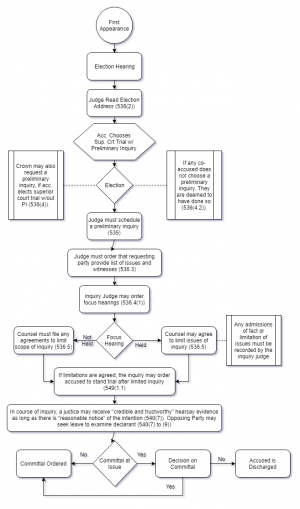Preliminary Inquiry
General Principles
The preliminary inquiry justice derives all of its authority from Part XVIII of the Code. [1]

Inquiry by justice
535 If an accused who is charged with an indictable offence is before a justice and a request has been made for a preliminary inquiry under subsection 536(4) or 536.1(3), the justice shall, in accordance with this Part, inquire into the charge and any other indictable offence, in respect of the same transaction, founded on the facts that are disclosed by the evidence taken in accordance with this Part.
R.S., 1985, c. C-46, s. 535; R.S., 1985, c. 27 (1st Supp.), s. 96; 2002, c. 13, s. 24.
– CCC
Where an election for trial by superior court judge (alone or with jury), the provincial court judge receiving the election must inquire whether the accused wishes to have a preliminary inquiry.[2] Where a preliminary inquiry is requested, the provincial court judge has jurisdiction to take evidence as a preliminary inquiry judge.[3]
The powers of a preliminary inquiry judge exist only in statute and within Part XVIII of the Code.[4]
- ↑ R v Hynes, 2001 SCC 82 (CanLII), [2001] 3 SCR 623, (2001), 159 CCC (3d) 359 (S.C.C.)
- ↑ see s. 535
- ↑ see s. 535
- ↑
Hynes, supra at para 28
Purpose
The purpose of the preliminary inquiry is to determine if there is sufficient evidence to set the matter down for trial before a Justice of the Superior Court.[1] In practice the Inquiry is used to test the strength of the Crown’s case.
Its purpose is also "to protect the accused from a needless, and indeed, improper, exposure to public trial where the enforcement agency is not in possession of evidence to warrant the continuation of the process." [2]
It is an "expeditious charge-screening mechanism"[3]
The inquiry judge has a general power to regulate the inquiry process under s. 537. The judge may require counsel to define the issues for which evidence will be called (see s.536.3), and may further limit the scope of the inquiry under section 536.5 and 549.
There is no constitutional right to a preliminary inquiry. Thus, any deprivation of a preliminary inquiry does not violate any principles of fundamental justice.[4]
- ↑
R v O’Connor, 1995 CanLII 51 (SCC), [1995] 4 SCR 411, at para 134 ("The primary function of the preliminary inquiry...is undoubtedly to ascertain that the Crown has sufficient evidence to commit the accused to trial")
R v Hynes, 2001 SCC 82 (CanLII), [2001] 3 SCR 623 at para 30-31
R v Coke, [1996] O.J. No. 808(*no CanLII links) , per Hill J. at para 8 to 11
R v Deschamplain, 2004 SCC 76 (CanLII) per Major J. R v MS, 2010 CanLII 61755 (NL PC) at para 24 - ↑ Skogman v The Queen, 1984 CanLII 22 (SCC), [1984] 2 SCR 93 at p. 105
- ↑ Hynes, supra at para 48
- ↑ R v SJL, 2009 SCC 14 (CanLII), [2009] 1 SCR 426, at para 21 per Deschamps J
Discovery Function
Prior to the amendments in 2005, it has also been used as a venue for discovery.[1]
Since the passing of the Criminal Law Amendment Act, 2002, c. 13 (Bill C-15A), discovery has lost some relevancy as a purpose of the preliminary inquiry. [2] The discovery purpose is "ancillary" to the main purpose of the hearing.[3]
The discovery function of the preliminary inquiry "does not encompass the right of the accused to call evidence ... which is solely relevant to a proposed application to exclude evidence at trial".[4]
Where the accused is in possession of all disclosure covering the investigation and offence there is some suggestion that the discovery purpose of the preliminary inquiry becomes largely irrelevant.[5]
Discovery function does not impose any obligations upon Crown to call all relevant evidence for trial.[6]
Given the discovery function of the preliminary inquiry
- ↑
R v Skogman, 1984 CanLII 22 (SCC), [1984] 2 SCR 93 at p. 105 (SCR)
("the preliminary hearing has become a forum where the accused is afforded an opportunity to discover and to appreciate the case to be made against him at trial where the requisite evidence is found to be present")
See R v Kasook, 2000 NWTSC 33 (CanLII) at para 25
- ↑ see SJL, supra, at paras 21 and 23, 24
- ↑
R v Bjelland, 2009 SCC 38 (CanLII) at para 36
SJL, supra at paras 21-24
R v Kushimo, 2015 ONCJ 28 (Ont.C.J.) (*no CanLII links) at para 18
R v Stinert, 2015 ABPC 4 (CanLII) at paras 6 to 17
- ↑ R v Cowan, 2015 BCSC 224 (CanLII), at para 96
- ↑
R v Thomas, 2017 BCSC 841 (CanLII) at para 21 ("... I note that Mr. Thomas has had disclosure of the entire Crown case, including the specifics of his arrest. The form of additional Charter discovery that he requested at the preliminary inquiry stage was irrelevant to the primary purpose of that proceeding.")
- ↑
R v Pietruk (H.C.J.), 1990 CanLII 6822 (ON SC) - application to compel Crown to call witnesses at preliminary inquiry denied
see also Electing a Preliminary Inquiry
